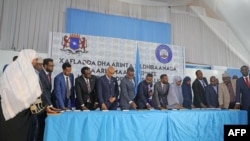More than 80% of Somalia's new parliament members were sworn in Thursday, following repeated poll delays and an ongoing feud between the president and the prime minister.
The chairperson of the Somali Federal Election Committee, Muse Guelleh Yusuf, hailed the event, held at the heavily guarded Mogadishu airport compound, as "a major breakthrough in the Somali electoral process."
"It was a historic breakthrough ending a long and exhausted electoral process that lasted nearly two years. Some 290 lawmakers have been sworn in today and the rest are expected to be sworn in in the coming days," Yusuf said.
But, he added, "we are missing some 25 seats which remain unfilled in the Hirshabelle and Jubaland states."
The oldest member of the new parliament, Abdisalan Dabana'ad, will informally serve as chairman until a speaker is elected. The legislature will begin its preparations for the elections of the speaker and then the president on Saturday.
Elections for lower and upper house lawmakers were scheduled to be completed before President Mohamed Abdullahi Mohamed's term expired in February 2021. But the elections dragged on, delayed by political and electoral disputes at both the regional and national levels.
With the new parliament seated, Somali political observers are breathing a bit easier.
"This ends an electoral process that has dragged on for [too] long ... largely due to the political dispute between President Mohamed Abdullahi Mohamed and his prime minister, Mohamed Hussein Roble. And now, as a new parliament is in place, I think it is a relief and it is a new dawn for Somalia politics," Somali diplomat Shafic Yusuf Omar told VOA Somali.
The swearing-in followed months of international pressure to complete the elections and choose a new president.
The United States, which has funneled billions of dollars in aid to Somalia and whose troops support Somali government efforts to fight the militant group al-Shabab, had imposed sanctions and visa restrictions on unnamed Somali officials if they disregarded the election timetable.
Once completed, the new parliament — which contains 275 lower-house MPs and 54 from the upper house — will jointly elect a president.




